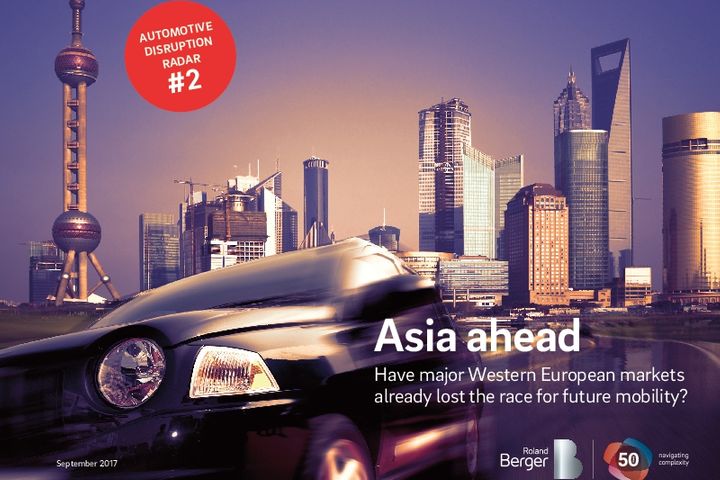 Roland Berger: Automotive Industry Is Accelerating Towards Autonomous Mobility, China Is Expected to Become a Leader in Autonomous Driving
Roland Berger: Automotive Industry Is Accelerating Towards Autonomous Mobility, China Is Expected to Become a Leader in Autonomous Driving(Yicai Global) Oct. 12 -- Roland Berger recently published its second issue of the Automotive Disruption Radar which systematically records global transformation processes in the automotive industry and monitors the disruptive environment to provide support for decision making. The Radar has identified certain acceleration in the trend towards autonomous mobility and predicted that China, whose ranking moved up to the second place for its progress of radical transformation, has a chance to become a leader in autonomous driving just as it did for e-mobility.
The Radar monitors the transition as today's automotive industry players transform into mobility service providers by looking at 27 selected indicators in five dimensions: customer interest, regulation, technology, infrastructure and industry activities. All indicators are analyzed across 11 countries (China, France, Germany, India, Italy, Japan, the Netherlands, Singapore, South Korea, the UK and the US), providing context for determining in which markets the transition is accelerating.
For the overall transformation process, all countries observed are moving towards a new paradigm of mobility: commercial, large-scale introduction of autonomous driving. Regulatory activities around the globe are opening the door for autonomous driving and the continuous growth for mobility. Customers show high interest in autonomous products and increasing willingness to leverage the internet for mobility satisfaction. Research and development activities are on the rise and venture capital invested in start-ups is climbing.
Compared to the first issue, the Netherlands has kept its top position in the ranking. China moved to the second place and represents the only major automotive market in the top 3. Singapore follows as the third. Other major automotive markets, such as Germany, France, Japan or the US, are ranked in the middle or at the bottom. Asia combines strong regulatory activities with high customer interests, thus providing the best conditions for new mobility solution.
China is speeding up its activities to take the lead in autonomous driving: a strong push for electrified vehicles and city traffic optimization, second highest rating regarding the number of shared vehicles on the road, expected further development in type approval of IL4/IL5 vehicles.These active actions plus the tech-savvy customers have formed a great basis for autonomous mobility.
With respect to regulation of autonomous vehicles, countries are quickly making significant progress in providing a legal framework for testing the new technology on public roads. Governments have made active moves towards enabling commercialization of IL4+ vehicles. Singapore shows the most acceleration in activities: autonomous vehicle trials can now take place on public roads and the Road Traffic Act has amended to provide more regulatory flexibility, setting the conditions for the first commercialization of "robocab" business models.
On the technology side, the Radar monitored increased industry efforts in research and development as well as the risen of venture capital investment. During the past few years, several alliances were formed between manufacturers to develop technology and lobby for autonomous vehicles. In addition, the industry is investing more venture capital in mobility totaled 12.5 billion in US dollars that increased 35 percent from last year, and in artificial intelligence with an increase of 21 percent to a total of 1.9 billion US dollars.
According to a customer survey conducted by the Radar, 45 percent are interested in autonomous mobility services. This technology is sure to be "the next big thing" in the automotive industry, as Johan Karlberg, a Partner of Roland Berger put it, "markets that have strong customer demand, low regulatory hurdles, general technology readiness, and sufficient infrastructure will take the lead in the race for future mobility."
Roland Berger, founded in 1967, is the only leading global consultancy of German heritage and European origin. With 2,400 employees working in 50 offices in 34 countries worldwide, we have successful operations in all major international markets. The strategy consultancy is an independent partnership exclusively owned by about 220 Partners. The Chinese market is a key pillar of Roland Berger's operations. With five offices and over 360 consultants, Roland Berger Greater China has over 30 years of experience working extensively with leading Chinese and international companies to address critical issues in strategy, operations, and performance.